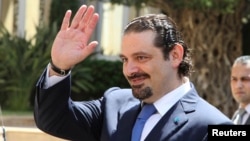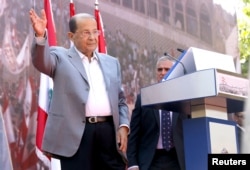Leading Lebanese politician Saad al-Hariri said Thursday there was "great hope" for ending the country's 18-month presidential vacuum after he proposed a power-sharing deal that would give the post to a political rival.
The proposal, widely discussed by politicians in Lebanon but yet to be announced formally, would make Maronite Christian politician Suleiman Franjieh president and Hariri, a Sunni Muslim, prime minister.
Speaking in France after a meeting with President Francois Hollande, Hariri said there was "great hope" for ending the paralysis that arose from the failure of rival politicians to agree on who should fill the presidency.
Asked whether the Franjieh proposal was still valid, Hariri said: "There are discussions under way and the climate is positive, God willing, and the coming days will show Lebanon to be in very good shape."
Franjieh said late Wednesday that his candidacy was not yet official but he was waiting for Hariri to formally endorse it.
"We have an historical opportunity,” Franjieh said. “Whoever has another [plan] for Lebanon, they should present it, but if we miss this chance today, I fear we will go into a worse phase than we're in.”
Fractured political history
Hariri, 45, leads the March 14 Alliance, a group of Lebanese parties that emerged a decade ago from opposition to Syrian influence over Lebanon, and is backed by Saudi Arabia.
Franjieh, 50, is a friend and ally of Syrian President Bashar al-Assad. He is part of the rival March 8 Alliance that includes the powerful, Iranian-backed Shiite group Hezbollah, which is fighting in the Syrian war alongside the Syrian army.
Hariri, Lebanon's most influential Sunni Muslim politician, left the country in 2011 after the March 8 alliance toppled the national unity government he was leading at the time. He has made only two, short trips to Lebanon since then.
Lebanon's rival camps are all represented in a unity government led by Prime Minister Tammam Salam. But political friction means the cabinet is barely able to make decisions.
Challenges ahead
The toughest challenge facing an agreement is winning over other Maronite politicians who are seeking the presidency, notably Michel Aoun, an ally of Hezbollah, and Samir Geagea, still officially March 14's candidate for president.
The Lebanese political crisis has been fueled by regional conflict between Saudi Arabia and Iran, which are on opposite sides of the war in Syria.
The Lebanese president is elected by parliament. Any understanding on filling the position is expected to include an agreement on a law for holding new parliamentary elections.






